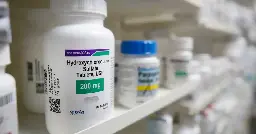Hydroxychloroquine could have caused almost 17,000 deaths in six countries during COVID, study finds
Hydroxychloroquine could have caused almost 17,000 deaths in six countries during COVID, study finds

www.politico.eu
Hydroxychloroquine could have caused 17,000 deaths during COVID, study finds

